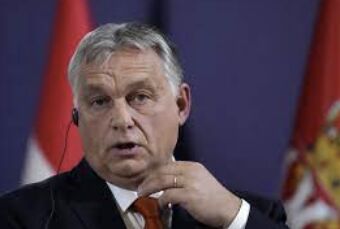Orban Uses Controversial Survey on EU aid to Ukraine to Rally Support Amidst Political Decline
Hungarian Prime Minister Viktor Orban has launched a survey on Ukraine's status with the EU, aiming to gather public opinion and strengthen his political base. Critics claim it is a political maneuver to distract from domestic issues, while Ukrainian officials are concerned about the impact on their relationship with the EU.
In a bid to strengthen his political base, Hungarian Prime Minister Viktor Orban has embarked on a controversial strategy to gather public opinion on Ukraine's status with the European Union (EU). On Friday, the government distributed a survey among its citizens, asking whether the EU should provide the war-torn country with increased financial aid or grant it membership. This move comes at a time when support for Orban's ruling Fidesz party has experienced a significant decline. According to a recent survey conducted by liberal think tank Republikon, Fidesz has lost 5 points of public support over the past year.
Compounded by Hungary's struggle with the EU's highest inflation rate and an economic slowdown, the government feels the need to rally its followers and regain political momentum. By framing the issue within the context of EU aid to Ukraine, Orban seems to be tapping into prevalent nationalist sentiments in Hungary, showcasing his commitment to protecting national interests. The ongoing conflict in Ukraine, coupled with the influx of Ukrainian migrants seeking refuge in Hungary, has fueled concerns among the Hungarian population. This survey aims to gauge public opinion and potentially leverage it to strengthen Hungary's relationship with the EU.
However, critics argue that this move is merely a political maneuver by Orban, attempting to distract attention from domestic issues and regain popularity. They argue that by posing the question in such a volatile manner, Orban is capitalizing on anti-Ukrainian sentiments and deep-rooted skepticism towards the EU. Moreover, the survey has drawn criticism for its lack of neutrality and transparency.
Critics point out that the questions heavily frame the issue from Orban's perspective, presenting a false dichotomy between increased funds for Ukraine and potential EU membership. They argue that by failing to include alternative options or providing a comprehensive analysis, the government is effectively manipulating public opinion. In response to the survey, Ukrainian officials have expressed concern, viewing it as a potential obstruction to their relationship with the EU. They argue that the focus should be on supporting Ukraine's ongoing struggle for stability and reform, rather than using it as a means to secure domestic political gains.
As Hungary prepares for the next general election in 2022, the government's survey has ignited a fiery debate within the country. While some see it as a necessary step to define Hungary's relationship with Ukraine and the EU, others view it as a calculated move to consolidate power and divert attention from pressing domestic issues. Only time will tell how this survey will impact Hungary's political landscape and its relationship with the EU.




